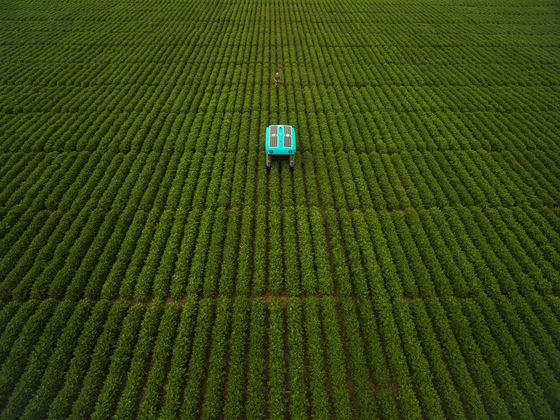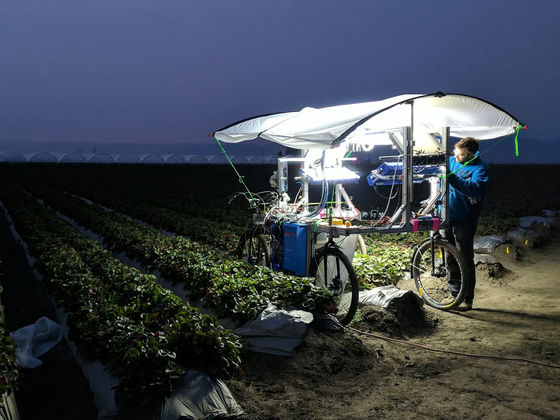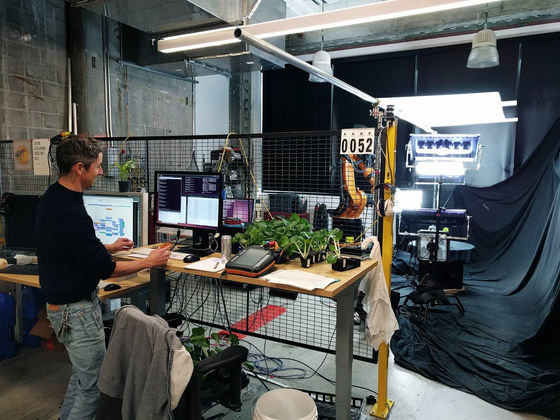Agricultural robot development project 'Mineral' promoted by Google parent company

Google's secret research institute,
Mineral --X, the Moonshot Factory
https://x.company/projects/mineral/

Alphabet's latest X project is a crop-sniffing plant buggy --The Verge
https://www.theverge.com/2020/10/12/21513353/alphabet-google-x-lab-moonshot-computational-agriculture-mineral-revealed
Elliott Grant, project leader of Mineral, said, 'Mineral uses artificial intelligence (AI), simulation, sensors, robotics, etc. to prototype and test various software and hardware on a large scale. It's a project focused on sustainable food production and agriculture. ' Mineral said, 'In order to feed the ever-growing population of the earth, the world's agriculture is more enthusiastic about the situation that reduces the productivity of our crops such as climate variability in the next 50 years than the previous 10,000 years We need to work on it, 'he said, citing the importance of projects to improve agricultural productivity.
Mineral's work begins with learning about the challenges facing farmers around the world. Early surveys ranged from Argentine soybean farmers to New Zealand kiwifruit producers. Research reveals that more information about biodiversity plants needs to be gathered quickly in order to find varieties that are resilient and productive in the face of climate change. It seems that it was done. Farmers around the world are forced to make hundreds of decisions each season, but some say that existing tools alone are not enough to meet the challenges they face. It seems that 'existing tools' include various sensors, spreadsheets, digital tools such as GPS, and it seems that it is not possible to fully analyze the complexity of agriculture even with them.

So Mineral is building new software and hardware to bring together a variety of sources that were previously too complex or useless. Grant said of Mineral's work, 'I hope that better tools will help the agricultural industry change the way food is grown, just as microscopes have changed the way disease is detected and managed. Over the last few years. , Our team has worked with people such as farmers, breeders, agronomists and scientists to develop tools for computational farming that collect and analyze information using different types of hardware, software and sensors. ' I'm talking.
The first tool developed by Mineral is called a 'plant buggy'. Plant buggies are equipped with cameras and sensors that can collect information for investigating and analyzing crops, soil and other environmental factors. The project team combined the data collected by the plant buggy with satellite photographs and meteorological data and combined it with machine learning and other AI training techniques to create a model for predicting 'how plants grow'. I will. The project team is already using a prototype plant buggy to study soybeans in Illinois and strawberries in California.

Plant buggies have taken high-quality photographs of plants and fruits in strawberry fields in California and soybean fields in Illinois. Plant buggies have analyzed not only strawberries and soybeans, but also melons, lettuce, oats, etc. It is possible not only to take pictures but also to classify varieties and count numbers.
According to Grant, Mineral will work with farmers and experts to come up with solutions that are practical and have real-world benefits. Grant said Mineral's ultimate goal was 'what if we could monitor all the plants and provide them with the exact nutrition they needed? And to elucidate the genetic and environmental factors that affect crop yields. What if you could do it? '

Related Posts:







